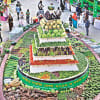Vegetable farmers hit hard by blockade

Vegetable farmers in Bangladesh are among the worst affected by a nationwide blockade that ended today as they were unable to register sufficient sales amid the political unrest.
Besides, the wholesale price of vegetables in Ishwardi upazila of Pabna fell by about 50 percent during the three-day blockade that began on October 31, farmers said.
With this backdrop, local farmers demanded an end to the hostilities so that the supply chain can return to normal.
They made this demand through a protest rally in front Muladuli haat, one of the biggest vegetable markets in Pabna, yesterday afternoon.
As a part of the protest, farmers poured huge amounts of vegetables onto the Pabna-Rajshahi highway.
The Bangladesh Krishak Unnayan Society, an association of farmers, organised the rally participated by hundreds of farmers from different areas.
They also brought out a human chain as a part of their protest, which was led by Siddikur Rahman Moyez, president of the farmers' association.
"Many vehicles were torched during the three-day blockade and so, most truckers do not dare to carry vegetables amid the ongoing political unrest," Moyez said.
This led to a lack of transportation facilities and the subsequent fall in wholesale prices, he added.
Local farmers and traders say each kilogramme (kg) of sheem, a type of broad bean native to the Indian subcontinent, is being sold for Tk 35-40 at wholesale while it was Tk 70-80 previously.
Similarly, the price of most other vegetables fell at wholesale markets across Pabna due to a lack of transport for the past three days.
Before the blockade, each kg of, cauliflower, okra and other vegetables sold for Tk 70 to Tk 80.
"It is time for producing other winter crops. So, we cannot store unsold vegetables and are being bound to sell them at cheaper rates," said Sajahan Ali Badsha, a leading farmer in the area.
"If the blockade prolongs, vegetable farmers will face massive loss," he added.
Previously, at least 8 to 10 trucks would carry vegetables away from wholesale markets in Pabna for retail in Dhaka and other cities in the country.
"But now, we are hardly supplying two or three trucks. So, vegetable prices have fallen," Badsha said.
Mita Sarkar, agriculture officer of Ishwardi upazila, said about 14,000 hectares are brought under vegetable cultivation every year, with half of it taking place during winter.
"This is one of the biggest growing districts in the country, producing vegetables worth up to Tk 2,500 core each year," Sarkar added.
It should be mentioned though that BNP yesterday announced another two-day blockade starting from November 5.

 For all latest news, follow The Daily Star's Google News channel.
For all latest news, follow The Daily Star's Google News channel. 








Comments